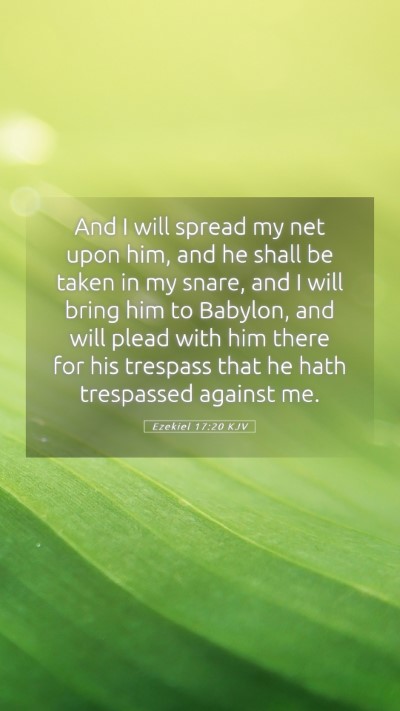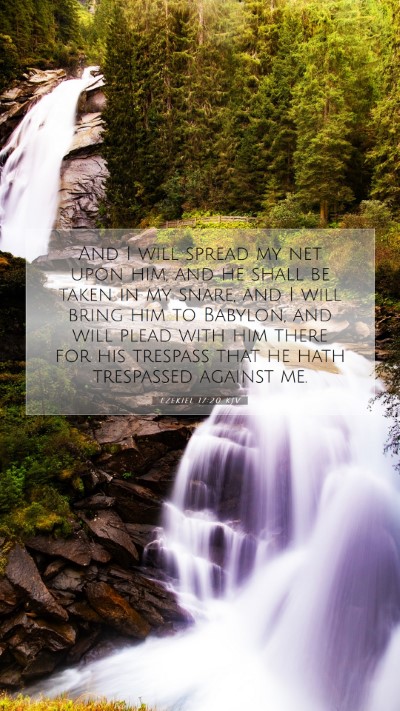Ezekiel 17:20 - Understanding the Verse
Ezekiel 17:20 states: "And I will spread my net upon him, and he shall be taken in my snare: and I will bring him to Babylon, and will plead with him there for his trespass that he hath trespassed against me." This verse holds significant meaning within the context of prophecy and divine judgment. In interpreting this verse, we will delve into various public domain commentaries to provide a comprehensive understanding.
Overview and Context
The Book of Ezekiel is filled with prophetic imagery and messages aimed at the people of Israel during their exile. This particular passage highlights God’s omnipotence in executing judgment.
Key Themes in Ezekiel 17:20
- Divine Sovereignty: This verse emphasizes God's control over nations and individuals.
- Judgment and Mercy: It indicates that God judges but also offers opportunities for repentance.
- Symbolism of the Net: The net symbolizes entrapment and eventual judgment that God will bring upon those who have sinned.
Bible Verse Meanings and Interpretations
This verse can be dissected for its meanings through several respected commentaries:
Matthew Henry's Commentary
According to Matthew Henry, this verse illustrates the inescapable nature of God's judgment. He writes that God will ensnare those who have strayed from His path, representing both the severity of divine justice and a chance for reconciliation. God's dragging the unfaithful to Babylon symbolizes a call to repenting for their sins.
Albert Barnes' Notes
Albert Barnes interprets the imagery of the "net" as God's method of capturing those who oppose His commandments. He suggests that this captures the essence of divine intervention in human affairs, wherein God uses historical events (like the Babylonian exile) to bring about a realization of sin among His people. This evokes a sense of urgency for repentance and reflection.
Adam Clarke's Commentary
Adam Clarke elaborates on the significance of Babylon as a place of both punishment and eventual redemption. Clarke indicates that God pleads with the trespasser, symbolizing an opportunity for the individual to return to Him and seek forgiveness, underscoring the notion of mercy intertwined with judgment.
Applying the Verse to Daily Life
For those engaging in Bible study groups, this verse serves as a poignant reminder of the importance of heeding God's warnings. The imagery can be acquired for personal reflection on how one can stray from moral pathways and the need for repentance.
Practical Lessons Derived from Ezekiel 17:20
- Awareness of Divine Attentiveness: Recognize that God sees our actions and intentions.
- The Call to Repentance: Understand that God seeks reconciliation with His people.
- Reflect on Choices: Consider personal decisions and their alignment with biblical teachings.
Related Bible Cross References
- Jeremiah 29:10-14: God's plans for His people during exile.
- Psalm 139:7-10: The omnipresence of God in our lives.
- Isaiah 55:6-7: Encouragement for the wicked to forsake their ways.
Conclusion
In conclusion, Ezekiel 17:20 serves as a vital scripture that showcases God's sovereignty, judgment, and mercy. Through its rich metaphorical language, we are reminded of the importance of staying true to our spiritual commitments and the transformative power of repentance. The insights gathered from respected commentaries deepen our Bible verse understanding and provide a pathway for personal reflection and growth in faith.
Further Study and Resources
For those seeking additional insights and Bible study resources, consider exploring various tools such as online commentaries, study guides, and discussion topics that enhance your understanding of scripture.


